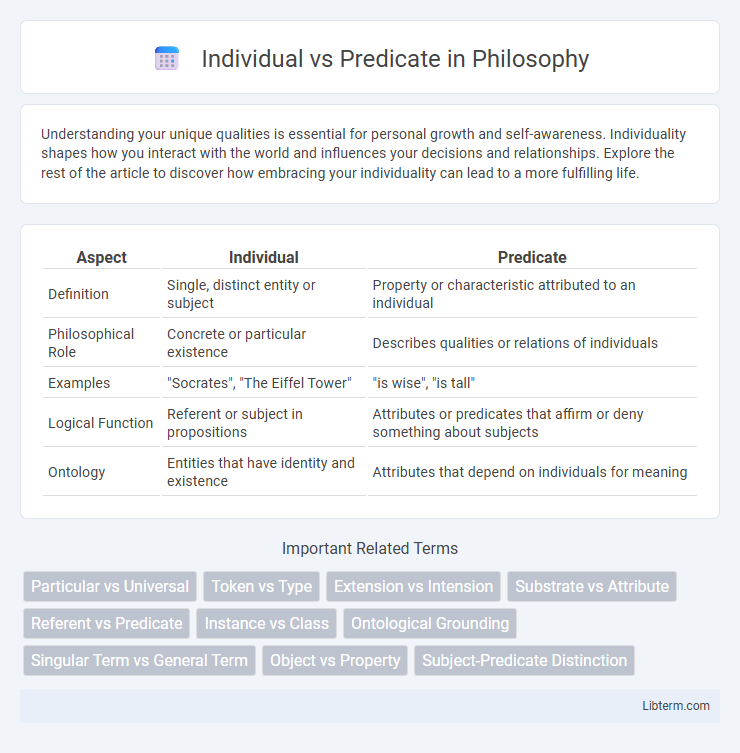Understanding your unique qualities is essential for personal growth and self-awareness. Individuality shapes how you interact with the world and influences your decisions and relationships. Explore the rest of the article to discover how embracing your individuality can lead to a more fulfilling life.
Table of Comparison
| Aspect | Individual | Predicate |
|---|---|---|
| Definition | Single, distinct entity or subject | Property or characteristic attributed to an individual |
| Philosophical Role | Concrete or particular existence | Describes qualities or relations of individuals |
| Examples | "Socrates", "The Eiffel Tower" | "is wise", "is tall" |
| Logical Function | Referent or subject in propositions | Attributes or predicates that affirm or deny something about subjects |
| Ontology | Entities that have identity and existence | Attributes that depend on individuals for meaning |
Understanding Individuals and Predicates
Understanding individuals and predicates is essential in logic and semantics, where individuals represent distinct objects or entities and predicates signify properties or relations attributed to these individuals. Individuals serve as the subject of statements, while predicates provide descriptive or relational information that can be true or false about these subjects. Emphasizing this distinction enhances semantic clarity in formal languages, ontology development, and knowledge representation systems.
Defining the Concept of an Individual
An individual in semantics refers to a unique entity distinguishable by its specific properties or identity, often contrasted with predicates that describe attributes or qualities applicable to one or more individuals. Defining the concept of an individual centers on its role as a singular referent within a domain, enabling precise identification and differentiation from others. This distinction is crucial for logical analysis and ontology, where individuals serve as foundational units for constructing meaningful statements.
What Is a Predicate in Logic and Language?
A predicate in logic and language represents a property or relation that a subject or individual can possess, often expressed as a function that returns a truth value. Predicates form the core of predicates logic, allowing statements about individuals by asserting attributes or relationships, such as "is red" or "loves Mary." Unlike individuals, which denote specific entities, predicates define conditions applied to those entities to evaluate truth within formal and natural language contexts.
Key Differences Between Individuals and Predicates
Individuals represent specific objects or entities within a domain, such as "Socrates" or "Paris," while predicates describe properties or relations that can be attributed to these individuals, like "is a philosopher" or "is located in France." The key difference lies in their roles: individuals serve as fixed points of reference, whereas predicates function as attributes or conditions that can be true or false depending on the individuals they apply to. Understanding this distinction is fundamental in logic, ontology, and knowledge representation, where individuals form the base elements and predicates define their characteristics and relationships.
Roles of Individuals in Semantic Structures
Individuals in semantic structures serve as concrete entities representing specific objects, events, or concepts, anchoring meaning within domain ontologies. Predicates function as relationships or properties that connect these individuals, defining interactions and attributes vital for knowledge representation. Roles of individuals clarify their participation in these relationships, enabling precise modeling of real-world scenarios and effective inference in semantic systems.
Functions of Predicates in Meaning Representation
Predicates serve as essential functions in meaning representation by assigning properties, relations, or actions to individuals, effectively structuring semantic information. They facilitate the expression of states or events by linking subjects (individuals) to their attributes or relationships within logical formulas. The functional role of predicates enables precise interpretation of meaning in formal semantics and computational linguistics.
Individual vs Predicate: Examples in Natural Language
In natural language, an individual typically refers to a specific entity such as "Alice" or "the Eiffel Tower," while a predicate describes a property or relation attributed to that entity, like "is tall" or "is located in Paris." For example, in the sentence "Alice is a musician," "Alice" is the individual and "is a musician" serves as the predicate expressing her occupation. Understanding the distinction between individual and predicate helps in semantic analysis and knowledge representation in linguistics.
Importance in Formal Semantics and Linguistics
Individual and predicate distinctions are fundamental in formal semantics and linguistics for constructing meaningful interpretations of language. Individuals represent specific entities or objects in a domain of discourse, while predicates express properties, relations, or conditions attributed to those entities. Precise differentiation enables accurate modeling of meaning, truth conditions, and syntactic structures, facilitating the analysis of quantification, reference, and logical inference in natural language.
Common Misconceptions About Individuals and Predicates
Common misconceptions about individuals and predicates often confuse their distinct roles in logic and linguistics. Individuals represent specific entities or objects, while predicates express properties or relations attributed to these individuals. Misunderstanding this distinction can lead to errors in formal reasoning, such as treating predicates as concrete objects or assuming individuals can possess truth values.
Implications for Computational Linguistics and AI
The distinction between individual and predicate plays a crucial role in computational linguistics and AI, influencing how natural language understanding systems interpret entities and their properties. Accurately modeling individuals as discrete entities and predicates as relations or attributes enables more precise semantic parsing and knowledge representation. This separation improves machine learning algorithms' ability to handle context, disambiguate meanings, and generate coherent natural language responses.
Individual Infographic

 libterm.com
libterm.com